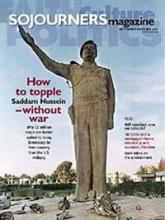Invite your friends, pass the cookies, and dig into Sojourners. Table Talk discussion guides provide a bi-weekly gathering place for communities to discuss issues of faith, politics, and culture--local and global. Table Talk offers a smorgasbord of questions (enough for four sessions, if you want to arrange it that way), as well as resources for further study and suggestions for action. You bring dessert.
Download in
Session I. 22 Million Iraqis
With Weapons of the Will (p. 20)
Nonviolence is not about putting flowers in gun barrels, say Peter Ackerman and Jack DuVall. It is not about making a point, it's about taking power. As the Bush administration maps a military route to ending the regime of Saddam Hussein, Middle East peacemakers remind the U.S. of a higher road to democracyone that incorporates the power of 22 million Iraqis.
Questions to Consider
1. What do you know about the history of the United States in Iraq? What do you think drives the Bush administration's plan to depose Saddam Hussein?
Read the Full Article
